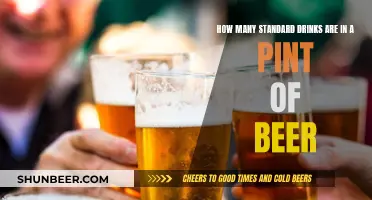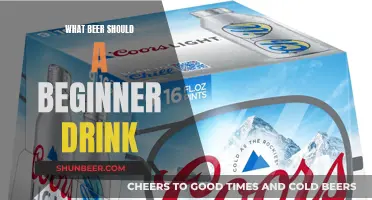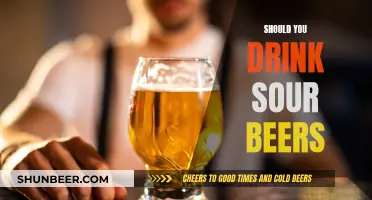
Drinking beer outside of a business in Kansas is a complex topic. While Kansas is not a dry state, it does have some strict alcohol regulations. For instance, open containers of alcohol are prohibited outside of private buildings and licensed on-premises alcohol sellers. However, there are some exceptions to this rule, such as in downtown Mission and Shawnee, which have established common consumption areas where alcohol can be consumed outdoors. Additionally, the sale of beer is only permitted at certain times, with off-premise sales allowed from 9 am to 11 pm Monday to Saturday, and on-premise sales from 9 am to 2 am any day. Furthermore, the minimum drinking age in Kansas is 21, and there are strict laws against drinking and driving, especially for those under the legal drinking age.
| Characteristics | Values |
|---|---|
| Drinking outside of a business in Kansas | Depends on the city or county |
| Open containers in public | Prohibited |
| Drinking in parks | Depends on the city or county |
| Drinking in a car | Prohibited |
| Drinking age | 21 |
| Minors drinking with parents | Allowed if supervised and directly given alcohol by their parents |
| Dry counties | 3 |
| Off-premise beer sales days and times | Monday to Saturday, 9:00 a.m. to 11:00 p.m. |
| Off-premise beer sales on Sundays | 9:00 a.m. to 8:00 p.m. |
| On-premise beer sales days and times | Any day, 9:00 a.m. to 2:00 a.m. |
| Beer delivery | Available in 6 cities |
What You'll Learn

Kansas' alcohol laws are among the strictest in the US
Kansas's alcohol laws are among the strictest in the US. The state had a long period of prohibition, lasting from 1881 to 1948, and continued to prohibit general on-premises liquor sales until 1987. Kansas's strict approach to alcohol is a legacy of its long era of prohibition.
Kansas has detailed and specific laws regarding the sale, distribution, and consumption of alcohol. Here are some key aspects of Kansas alcohol laws:
- Prohibition History: Kansas was the first state in the US to enact a statewide constitutional prohibition on alcohol, which lasted from 1881 to 1948. This was followed by continued restrictions on alcohol sales until the 1980s.
- Licensing and Regulation: The sale and distribution of alcohol are highly regulated by the Kansas Division of Alcoholic Beverage Control. Businesses involved in the alcohol industry must obtain various licenses and adhere to strict guidelines.
- Retail Liquor Stores: These stores are subject to stringent requirements regarding ownership, employee qualifications, operating hours, and permitted products. They can only sell beer, wine, spirits, and non-alcoholic malt beverages.
- Cereal Malt Beverage (CMB) Retailers: CMB retailers have similar but slightly less stringent requirements compared to retail liquor stores. They can sell CMB and non-alcoholic malt beverages.
- On-Premises Sales: Kansas had a long history of prohibiting the sale of liquor by the drink in public places. While this has been relaxed in recent years, there are still strict regulations and licensing requirements for bars and drinking establishments.
- Open Container Law: Open containers of alcohol are generally prohibited outside of private buildings and licensed on-premises alcohol sellers. This includes vehicles, with some exceptions for limousines and mass transit.
- Drinking Age and DUI Laws: Kansas has a strict drinking age of 21, and driving under the influence (DUI) is a criminal offense with harsh penalties, including license suspension and potential felony charges for repeat offenses.
- Dry Counties: As of 2023, Kansas has one dry county where on-premises liquor sales are prohibited, but the sale of 3.2% beer is allowed.
- Alcohol Categories: Kansas law divides alcohol into six categories (alcoholic liquor, cereal malt beverage, non-alcoholic malt beverage, domestic table wine, domestic fortified wine, and domestic beer), each with its own regulations.
- Taxation: All liquor sales are subject to a 10% "drink tax" on gross receipts for businesses selling liquor.
Beer Belly: Is Your Weekend Drinking to Blame?
You may want to see also

Kansas has a three-tier liquor distribution system
Kansas's three-tier system has some exceptions. Farm wineries and microbreweries may sell directly to the consumer, and establishments may purchase beer and bulk wine directly from wholesalers.
Kansas has some of the strictest alcohol laws in the United States, and its approach to alcohol is informed by its long history of prohibition. From 1881 to 1948, Kansas had statewide prohibition, longer than any other state. Even after the Twenty-first Amendment ended nationwide prohibition in 1933, Kansas continued to prohibit general on-premises liquor sales until 1987. As of March 2023, Kansas has one dry county, where on-premises liquor sales are prohibited, but the sale of 3.2% beer is permitted.
Kansas law divides alcohol into six categories, each regulated differently: "alcoholic liquor" (including spirits, wine, and beer containing over 3.2% alcohol by weight); "cereal malt beverage" (beer containing less than 3.2% alcohol by weight); "nonalcoholic malt beverage" (beer containing less than 0.5% alcohol by weight); "domestic table wine" (wine containing 14% or less alcohol by volume, manufactured by Kansas farm wineries); "domestic fortified wine" (wine containing between 14% and 20% alcohol by volume, made in Kansas); and "domestic beer" (beer containing 8% or less alcohol by weight, manufactured by Kansas microbreweries from Kansas-grown agricultural products).
Mixing Beer and Wine: What's the Harm?
You may want to see also

Kansas' drinking laws are more strict than some other states
Kansas' open container laws are stricter than those of neighbouring Missouri. You can't drink beer or other alcoholic beverages in public on Kansas streets, unless there is an event with a permit that allows visitors to carry and drink alcohol. In 2017, a law was passed that allowed Kansas cities and counties to establish common consumption areas where alcohol could be consumed in public. For example, you can drink in public in downtown Mission and downtown Shawnee, which have both established common consumption areas.
Kansas' drinking laws are also stricter than some other states when it comes to the sale of alcohol. Off-premise beer sales can be made from 9:00 am to 11:00 pm Monday to Saturday, and from 9:00 am to 8:00 pm on Sundays. On-premise beer sales can be made from 9:00 am to 2:00 am any day. In bars and restaurants, alcohol can be sold from 9:00 am to 2:00 am, as long as the establishment has the license and derives 30% of gross sales from food.
Kansas' drinking laws are also more strict than some other states when it comes to the legal drinking age. The minimum drinking age in Kansas is 21, and there are strict laws in place regarding drinking and driving. If you are under 21, you must have a BAC of 0.02% or lower when operating a motor vehicle. If you are over 21, the limit is 0.08%, and 0.04% for commercial drivers.
Kansas' drinking laws are also stricter than some other states in terms of licensing requirements. To sell alcohol, establishments must have a license from the state and, in some cases, an additional license from the city or county. Retail liquor stores must meet a range of requirements to obtain a license, including that the licensee must have been a US citizen for 10 years and a resident of Kansas for 4 years.
Overall, while Kansas is not a dry state, its drinking laws are more strict than those of some other states, reflecting the state's history of prohibition.
Beer and Diarrhea: Should You Drink or Ditch?
You may want to see also

Kansas' open container laws are more strict than Missouri's
Kansas's open container laws are more strict than Missouri's. While Missouri has no statewide law that prevents residents from drinking alcohol in public places, Kansas prohibits drinking beer or other alcoholic beverages in public on Kansas streets unless there is an event with a permit that allows visitors to carry and drink alcohol on event grounds. This law was passed in 2017 and also established that Kansas cities and counties can establish common consumption areas that allow alcohol in public.
In addition to having stricter open container laws, Kansas has stricter alcohol laws in general when compared to Missouri. Kansas had statewide prohibition from 1881 to 1948, longer than any other state, and continued to prohibit general on-premises liquor sales until 1987. As of March 2023, Kansas has one dry county, where on-premises liquor sales are prohibited, but the sale of 3.2% beer is permitted. In contrast, Missouri does not have any dry counties.
Kansas also has stricter laws regulating the sale of alcohol. Off-premise beer sales in Kansas can only be made Monday through Saturday from 9:00 a.m. to 11:00 p.m., while on-premise beer sales can be made from 9:00 a.m. to 2:00 a.m. any day. Missouri, on the other hand, does not have statewide restrictions on the days or hours that alcohol can be sold.
Kansas also has stricter laws regarding the minimum drinking age. In Kansas, the legal drinking age is 21, and there is a zero-tolerance policy for drinking and driving under the age of 21. In Missouri, the minimum drinking age is also 21, but there is no mention of a zero-tolerance policy for underage drinking and driving.
Overall, Kansas open container laws and alcohol laws in general are more strict than those in Missouri. Kansas has a long history of prohibition and continues to regulate alcohol sales and consumption more strictly than Missouri.
Pigs and Beer: A Curious Combo
You may want to see also

The minimum drinking age in Kansas is 21
Kansas has some of the strictest alcohol laws in the United States, and the minimum drinking age in the state is 21. This is in line with the legal drinking age across the country, although some states make limited exceptions for 18 to 20-year-olds who are at home and under parental supervision. In Kansas, there is an exception for minors, who can drink beer with their parents if they are supervised and the beer is purchased and directly given to them by their parents.
Kansas had statewide prohibition from 1881 to 1948, longer than any other state, and continued to prohibit general on-premises liquor sales until 1987. The state's strict and highly regulated approach to alcohol is a legacy of its long history of prohibition.
Kansas's drinking laws are enforced by the Kansas Division of Alcoholic Beverage Control, or ABC. The state has a three-tier liquor distribution system, meaning alcohol is distributed from manufacturer to distributor to retailer. The only exceptions are that farm wineries and microbreweries may sell directly to the consumer, and establishments may purchase beer and bulk wine directly from wholesalers.
Off-premise beer sales in Kansas can be made from 9:00 a.m. to 11:00 p.m. Monday to Saturday, and from 9:00 a.m. to 8:00 p.m. on Sundays. On-premise beer sales can be made from 9:00 a.m. to 2:00 a.m. any day.
Kansas's open container laws are more strict than those in neighbouring Missouri. You can't drink beer or other alcoholic beverages in public on Kansas streets, unless there is an event with a permit that allows visitors to carry and drink alcohol on the event grounds. In 2017, a law was passed that also established that Kansas cities and counties can set up common consumption areas that allow alcohol in public.
Kansas's drinking and driving laws are also strict. The state has a no-tolerance policy for drinking and driving under the age of 21, and defying it could result in serious consequences, including a 30-day suspension of your license and an extended period of 330 days of restricted driving privileges. If you are 21 or older, there is more leniency, but driving with a blood alcohol content (BAC) above 0.08% is punishable. Consequences for first-time offenders include jail time, community service, fines, drug and alcohol classes, license suspension, and the implementation of an ignition interlock device following the suspension.
Beer and Stress Tests: What You Need to Know
You may want to see also
Frequently asked questions
Yes, but only in certain areas. Kansas' open container laws are more strict than in some other states. You can't drink beer or other alcoholic beverages in public on Kansas streets unless there's an event with a permit that allows visitors to carry and drink alcohol on event grounds. However, some cities and counties in Kansas have established common consumption areas that allow alcohol in public. For example, you can drink in public in downtown Mission and downtown Shawnee, which have designated common consumption areas.
No. The minimum drinking age in Kansas is 21. There is an exception for minors, though. Minors can drink beer in Kansas with parents if they are supervised and the beer is purchased and directly given to them by their parents.
Yes, but only in certain areas. See the answer to the first question for more information.







